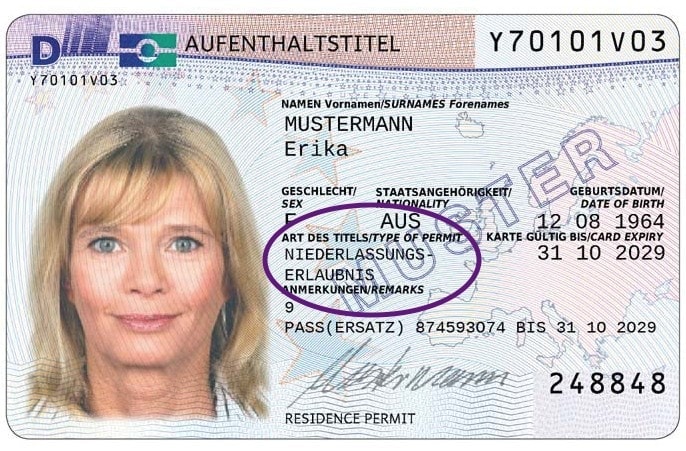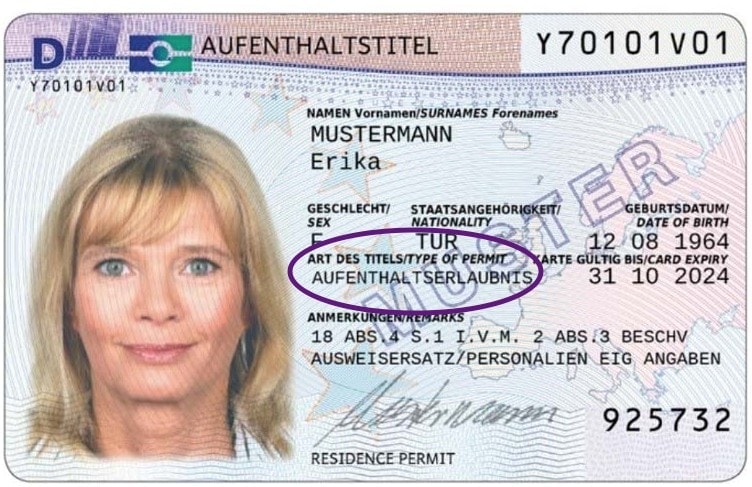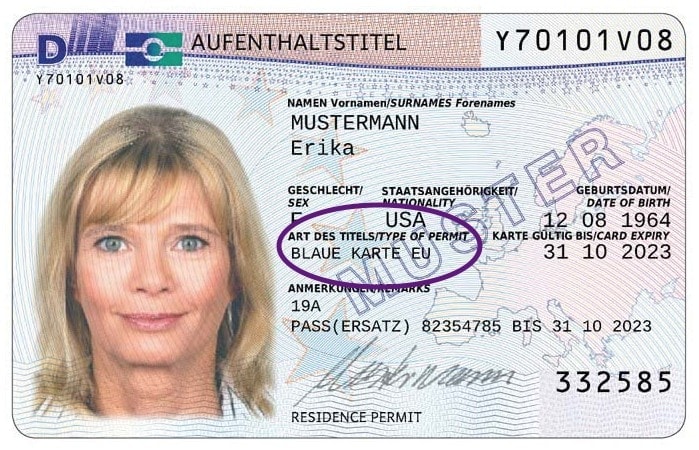The permanent residence in Germany often referred to as PR by expats, is a crucial bureaucratic document on your way to fully settle in Germany. In this guide, we will discuss its benefits, requirements, and application process.
What is a German Permanent Residence Permit?
A permanent residence permit (Niederlassungserlaubnis) in Germany allows you to live, work, and study in Germany for an unlimited time. It is also known as a settlement permit. The permanent residence permit is the step after a temporary residence permit (Aufenthaltserlaubnis) and a step before acquiring German citizenship through naturalization (Einbürgerung).
Temporary vs. Permanent Residence Permit Germany
The ID card for your residence permit in Germany looks identical and you need to look closely to identify its type. Below you can see two images indicating the clear distinction between a Niederlassungserlaubnis and Aufenthaltserlaubnis.
German Permanent Residence Permit

German Temporary Residence Permit

What are the benefits of a Permanent Residence Permit in Germany?
The main benefit of achieving permanent residence in Germany is more freedom. Freedom of movement, freedom of employment, freedom of worry. If you wish to change jobs or become self-employed, you can do so without worrying about your visa status. Unlike the temporary residence permits, which you get through any type of visa (except a tourist visa), you are no longer bound to a company or a specific job.
Can you travel with your German Permanent Residence Permit?
Yes, you can travel freely within the EU with your German settlement permit, but be sure to always carry your passport with you as well. For some countries outside the EU, you might encounter fewer visa restrictions, when holding a German permanent residence permit.
Can German Permanent Residence expire?
Yes, it can. If you leave Germany for longer than six months (without prior permission), your German permanent residence permit will expire.
How to maintain German Permanent Residence
Once you receive your permanent residence permit for Germany, it is valid for an unlimited period. However, the residency ID card is only valid for 5 – 10 years, similar to a national ID card or passport. Since it is tied to your passport, you need to keep both documents valid. To renew your permanent residence permit or in case you lose your residence title (Aufenthaltstitel), you need to make an appointment with your local Ausländerbehörde and request a new physical permit.
How long does it take to get Permanent Residency in Germany?
Usually, you will receive permanent residence in Germany after you have lived and worked for five years in Germany. We will look at the exact requirements below. When you start your stay in Germany with a temporary residence permit, it is usually valid for two years. If you still have a valid work contract after those two years, you will get another temporary residence permit for again two years.
After yet another year, you can schedule an appointment with your Ausländerbehörde to apply for permanent residency. Once you have handed in all necessary documents, it usually takes four to eight weeks until you can pick up your permanent residence title. We list the application process in detail below.
Read Our Related Guide
Who can get a Permanent Residence Permit in Germany with reduced waiting time?
There are a few circumstances that can allow you to apply for permanent residence in Germany after two or three years. Let’s take a look at the categories entitled to special provisions:
EU Blue Card Holders
As an EU Blue Card holder, you can already apply for permanent residence after only 27 months if you can prove A1 German skills. With a B1 German language certificate, you can even apply after 21 months! This is by far one of the fastest ways of becoming a permanent resident in Germany. Be aware, though, that only those months are counted in which you lived in Germany, you held employment, and you contributed to the statutory pension insurance.
Read Our Related Guide

Read Our Related Guide
Graduates Of German Universities Or Vocational Training
In case you have acquired a German degree or vocational training certificate, you can apply for permanent residency after being employed in your field and contributed to the statutory pension insurance for 2 years. You must also have sufficient German language skills (B1 level).
Highly Skilled Professionals
In special cases, highly skilled professionals (e.g., scientists and other specialists) can qualify for permanent residency immediately without needing to fulfill any prior time spent in Germany. The requirements for this special treatment are very individual and on a case-by-case basis.
You need an academic degree, several years of professional experience, and a certain level of higher skills. You will also need to demonstrate that you will integrate into life in Germany smoothly and will not require financial assistance from the German social system.
Self-Employed People
When you come to Germany with a freelance visa or acquire it while in Germany, you can already apply for permanent residence in Germany after 3 years, provided that your business idea is striving and providing enough financial resources.
Read Our Related Guide
Family Members Of A German Citizen
Suppose you have rejoined with a family member in Germany, who is a German national. In that case, you can change your temporary residence permit for a permanent residence permit after 3 years if the family unit is still in place and you have a B1 level command of the German language. This applies to spouses and minor unmarried children alike.
Requirements for a Permanent Residence Permit in Germany
To be eligible for a permanent residence permit in Germany, you must fulfill the following requirements and provide the following documents:
- Minimum of 5 years residence in Germany with at least 60 months of contributions to the German pension insurance (Rentenversicherungsverlauf), unless you qualify for a fast-track as described above
- No criminal record (Führungszeugnis)
- B1 German level (integration course, language course, or test certificate)
- Proof of being financially secure (work contract, last payslips, or bank records; for self-employed the latest tax return)
- Proof of registration and accommodation (rental contract and Meldebescheinigung for your living space)
- Proof of health insurance from your health insurance fund
- For any fast-track applicant, the proof that allows you to fast-track (degree, business permit, EU Blue Card, marriage certificate, etc.)
- Valid passport
- 1 biometric photo
Good to know
You don’t have to have a minimum amount of money saved up to apply for a permanent residence permit. You just need to be able to show some proof of financial security. If you’re employed, an example could be your work contract, last payslips, or bank records.
Some cities may require additional documents, so be sure to familiarize yourself regarding your individual case.
Requirements for a Permanent Residence Permit for family members of foreign nationals in Germany
Should you have moved to Germany with your children, they most likely received a temporary residence permit similar to yours. Let’s take a look at their eligibility for a settlement permit in Germany.
Children of Foreign Nationals in Germany
If your child has had a German residence permit for at least five years before turning 16, he or she will be able to receive a settlement permit after his or her 16th birthday, according to BAMF.
If your child only completes the five years of holding a temporary residence permit after turning 16, your child needs to prove a good knowledge of the German language and a ‘secure livelihood’. This includes attending school or vocational training.
Family Members of Foreign Nationals in Germany
Should your life partner or spouse receive a settlement permit, you thereafter qualify to apply for a German settlement permit as well. Even if your relationship or marriage falls apart, you keep that right, as long as you can prove that you are financially secure (including alimony payments from your former partner).
Family reunification and immigration law is a very complex topic with many individual factors. We highly recommend consulting immigration experts such as Schlun & Elseven.
The application process for a Permanent Residence Permit in Germany
The application process for permanent residence in Germany (Antrag auf Erteilung einer Niederlassungserlaubnis) varies from city to city. In some cities, like Berlin, you have to send a written application with all documents, and then you are given an appointment. In other cities, you need to make an appointment first and then present your documents. Let’s have a look at both cases.
How To Apply for A Permanent Residence Permit in Berlin
The governmental office in charge of residence permits in Berlin is the Landesamt für Einwanderung (LEA), located in Standort Friedrich-Krause-Ufer. Here is an overview of the application process:
- Send your documents via the correct contact form
- You will receive a reply with further details on what to do
Before you apply with them, you must have all the required documents listed on the official website, plus this extra application form. Once you’ve gathered your documents, you need to send a written application to them via their contact form. As of the time of writing this guide, the LEA has stopped accepting email and fax communication.
You need to send your application to the right department. To find the right department, you can check their organizational chart.
If you’re a Blue Card holder or have a residence permit through family reunification, the departments B1 / B2 / B3 are responsible for this process. The cases are assigned to a department based on the letter your last name starts with.
- B1: Your last name starting with A-G
- B2: Your last name starting with H – Or
- B3: Your last name starting with Os – Z
Once you know the department, you can find their contact form in the official department list.
As an example, I have a Blue Card, and my last name starts with a P. So I would need to send my application to the B3 department.
If you have a residence permit other than a Blue Card or family reunification, the departments E2 – E6 are responsible for your case. These departments handle the applications based on your nationality. You can find your nationality on their website.
Once you know the department, you can find their contact form in the official department list.
For example, I have a normal residence permit (NOT a Blue Card) and my nationality is Guatemalan. So I need to send my application to the E2 department.
In other cities, like Düsseldorf, you must make an appointment first and provide all documents in person. Below you can find the links to the requirement pages of the biggest expats cities in Germany. They are in German, but you can use Chrome as a browser and translate the page with a right-click.
- Dusseldorf – personal appointment first with online appointment
- Munich – online application
- Hamburg – personal appointment first with appointment via email and extra application form
- Frankfurt – personal appointment first with appointment via email and extra application form
- Stuttgart – personal appointment with online appointment and extra application form
During the personal appointment, you might have to prove your knowledge of the German language and your understanding of the legal and social and political system in Germany. For Jen, my wife from Guatemala, it was enough to do some small talk, but you want to be prepared either way.
Costs of a Permanent Residence Permit in Germany
The cost for a permanent residency permit in Germany depends on the job category you are in:
- General: 113 euros
- Self-employed: 124 euros
- Highly qualified professional: 147 euros
- Re-issuing: 67 euros
Conclusion
Acquiring permanent residence in Germany for the freedom of movement and employment is pretty straightforward and, in most cases, dependent on the number of years you have already lived and worked in this beautiful country. Depending on your degree and job, you may be able to fast-track the usually necessary five years. Your local Ausländerbehörde handles the application process.
Good luck with this essential step to settle in Germany for good!
Disclaimer: Neither myself as the author of this article, nor Simple Germany as a business, are qualified to provide immigration advice under German law. We cannot provide specialist immigration services beyond any of the general tips contained herein. For immigration advice, we strongly recommend you consult a professional immigration consultant or your local German embassy or Foreigners office.


